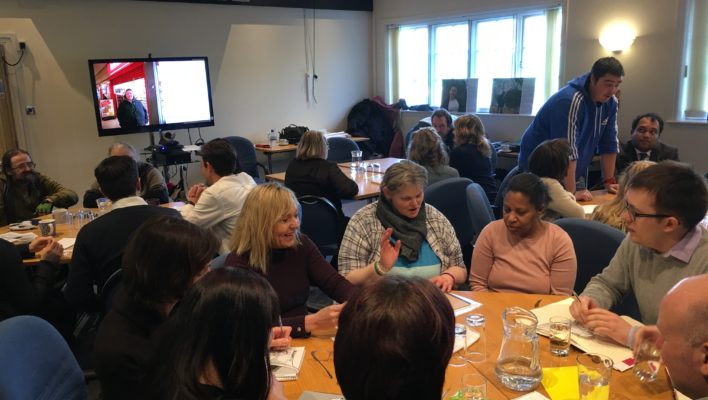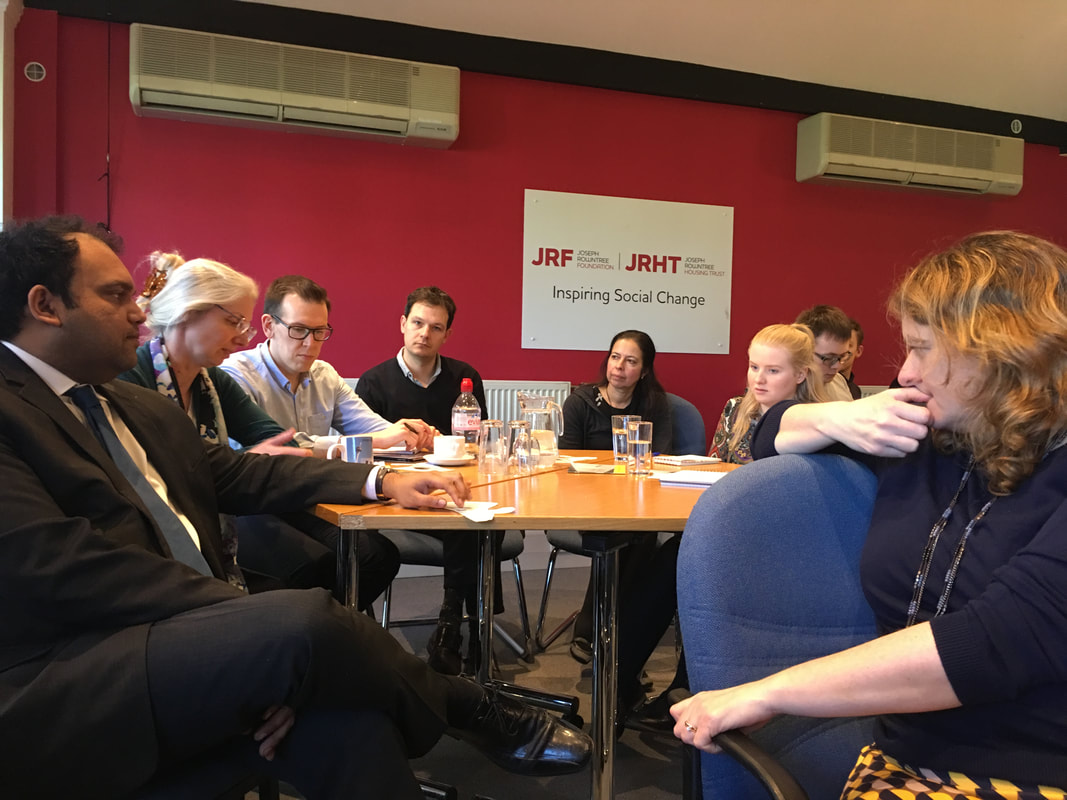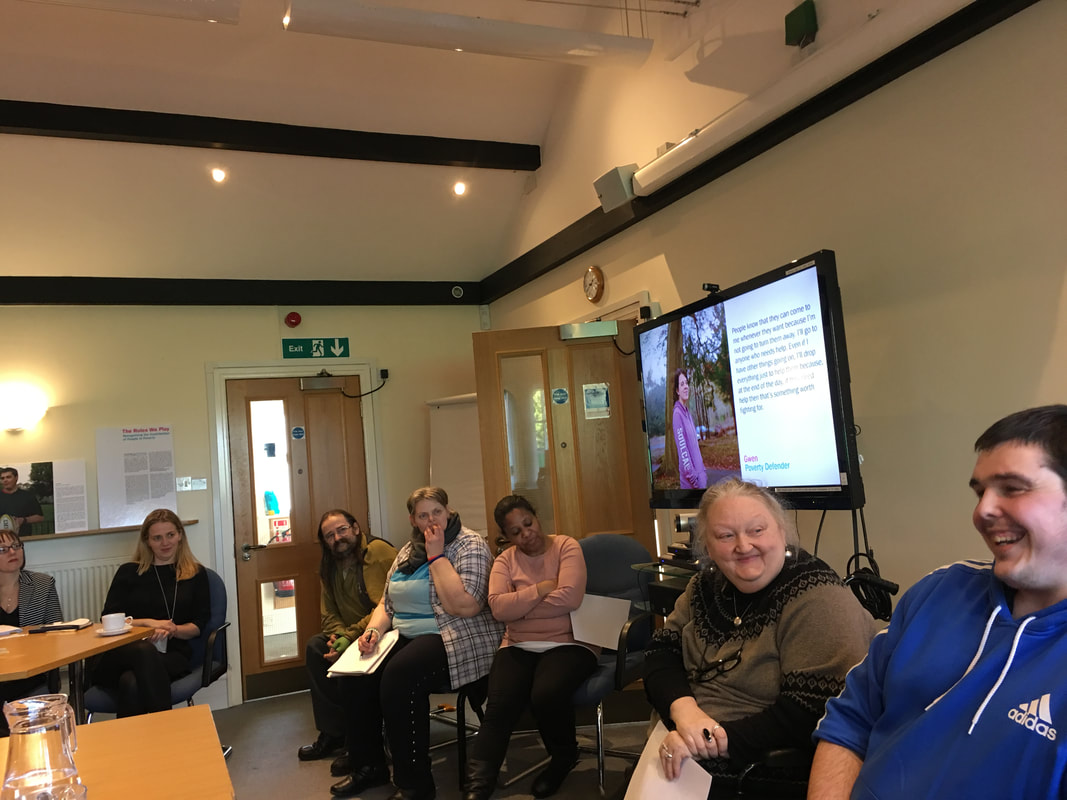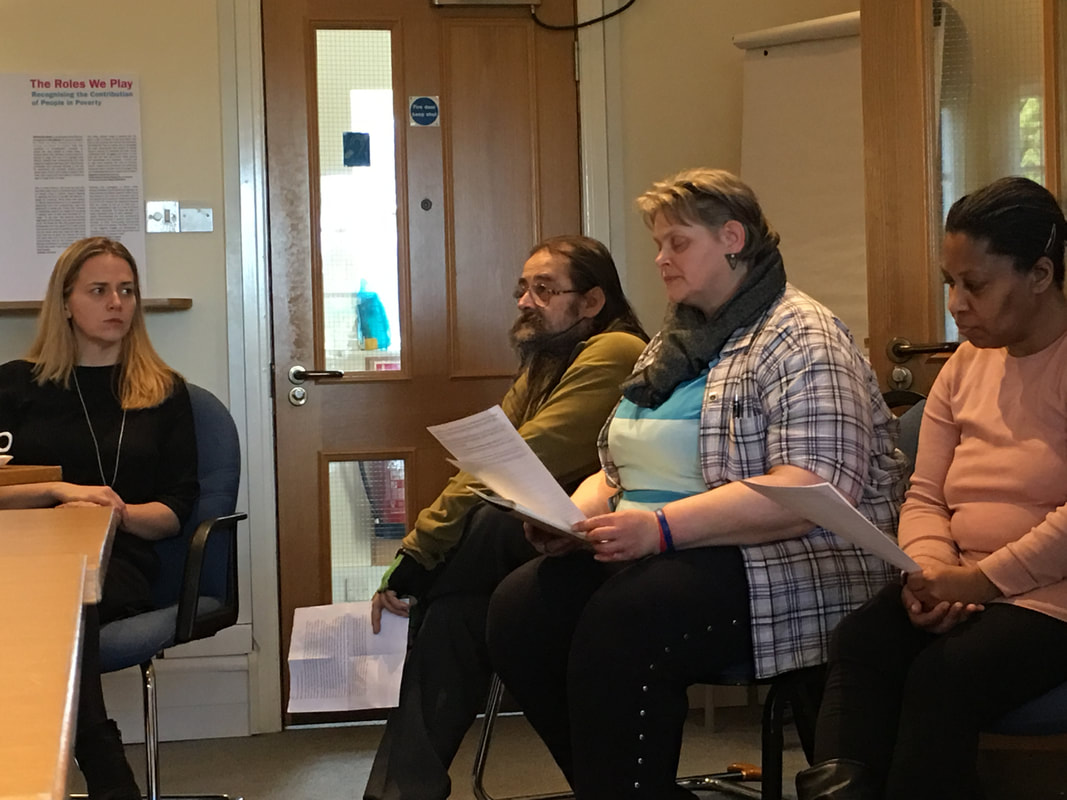Bringing Experts on Poverty Together

In January 2018, the Joseph Roundtree Foundation (JRF) invited ATD Fourth World’s #PovertyExperts to York to run a workshop on participation and ownership. All the facilitators had direct experience of poverty. One of the participants on JRF’s staff later said:
“I have worked alongside people with lived experience for over thirteen years; yet I never fail to learn something new or deepen my understanding of poverty when I take the time to sit and really listen. This learning session run by the activists with lived experience of poverty from ATD Fourth World was no exception.”
A panel of four Poverty Experts led group exercises, conversations, and presentations for a room full of staff of the Joseph Roundtree Foundation. The panel’s first question was, “What does poverty mean to you?” After initial replies from the audience, panellists shared real-life examples about poverty, which simulated a very rich discussion. A distinction was drawn between the emotional and the material aspects of poverty when a panellist explained: “When you live in long-term poverty, you have to depend on services that are delivered with suspicion and disdain. They make you feel humiliated. The media and politicians speak about the poor in derogatory ways when they use terms like ‘lazy’, ‘scroungers’, ‘feckless parents’ and ‘underclass’. The stereotyping of all poor people dehumanises them in the eyes of others.” A JRF participant reacted:
“This event reminds us that, although poverty is fundamentally about income, it manifests in many different ways; it is about a deep sense of injustice, shame and powerlessness. This emotional impact systematically comes across strongly when hearing from people with lived experience.”
The panellists continued to offer personal reflections on themes such as: the importance of recognition; having ownership of your own image; the importance of expression; overcoming the shame and stigma of living in poverty; and the importance of genuine participation. They referenced extracts and images from ATD’s project ‘The Roles We Play: Recognising the Contributions of People in Poverty‘ as a model of participation and ownership. One of them said, “You need somebody that takes time to listen to what you say, takes on board your views and your feelings so that you are able to feel confident and able to ask any questions without fear of being judged.” This, too, was noted as meaningful by a JRF participant:
“I was struck by how strongly people spoke about the importance of owning their image and the impact of having limited input into how they are written about and how disempowering an experience this is. This workshop made me think much more about participation and the difference it makes allowing the space and time for people to have full ownership and to shine so brightly through doing so. The evidence of the impact that this approach can bring about was in the room.”
Another Poverty Expert noted: “Living in poverty gives us knowledge of the causes and effects of poverty, but also of solutions and how to build resilience to poverty, and how to build community. All our struggles and suffering would be for nothing if we could not share our knowledge. Being listened to by those who can make changes is our only hope for a better future.” After the initial presentations, there was time for more informal dialogue, conversation, and questions. The energy in the room seemed to pick up and the agenda moved into a more reciprocal conversational dynamic, in which the audience genuinely had many questions and concepts to share with the panellists, resulting in some insightful shared learning. A JRF participant said:
“It still feels like there is a some way to go in: ensuring a rigorous approach to participation; allowing sufficient time for useful reflections and contributions; genuinely taking on board what people say; and acknowledging the power dynamics that are at stake when hoping to work in this way. We need to move from passive to more active involvement processes.”
A Poverty Expert added, “We mention often the importance of being listened to and being heard, but it’s more than that. When we are really listened to, action should follow. When your ideas or requests are taken into account or actioned, it’s important and you feel valued… When people are listened to, and their ideas are taken on board, you can often come up with better answers, and these are the solutions that work.”
The event concluded with a short evaluation and some informal mingling over tea and coffee. Among the comments on the evaluations from JRF participants:
- “It was an absolute privilege to be part of the workshop today, so thank you and all the panellists for all the hard work, time and energy that has gone into this workshop and all of the things you do.”
- “Listening to the group from ATD Fourth World reminded me how fundamental this type of work is …not just because ‘it’s a nice thing to do’, but to enable the conditions that can help bring about social change at all levels of society.”
The Poverty Experts also evaluated the workshop:
- “For me this event was very important. It gave us the opportunity to show the origins, process and results of ‘The Roles We Play’ and how it has evolved into these public conversations. Being asked to run this workshop by JRF is a mark of recognition for all our hard work and the work of ATD Fourth World, based on the principles of participation.”
- “This kind of workshop is important because without working with others who have some of the same goals as us we will not be able to make big changes to society’s opinions on poverty.”
- “During the workshop, it was good getting questions from those present in the room as it showed they were interested in what we had to say. They had listened to us, and the questions were thought-provoking.”
- “It would be good to carry on with our connections with JRF and find ways to support each other in moving forward together.”
- “My opinion of the key message is that people who have experienced poverty need to be included in any discussion to eradicate it.”
The workshop described above was part of a series called “An Audience with the Real Experts on Poverty”, which supports people with a direct experience of poverty to be at the heart of designing and leading participatory panel discussions, multi-media presentations and interactive workshops. The Poverty Experts speak about their personal experiences living in poverty and their collective expertise in managing the multiple ways in which it adversely affects their lives, while promoting ideas and solutions on how to overcome poverty. They shed light on how they contend not only with the hardship but also with negative stereotypes and the use of pejorative language and imagery. Moreover, they provide evidence of the positive contributions people in poverty can make in society.
If you are interested in learning more about this project and would like to have ATD’s Poverty Experts run a workshop at your space, please contact Dann Kenningham
@kenninghamd @atd-uk.org
Website: https://atd-uk.org / Facebook: ATD Fourth World UK/
Twitter: @ATDFourthWorld #PovertyExperts
https://givingpovertyavoice.weebly.com/blog/what-does-it-mean-to-be-an-expert
By : Sarah – Joseph Rowntree Foundation and Dann – ATD Fourth World




